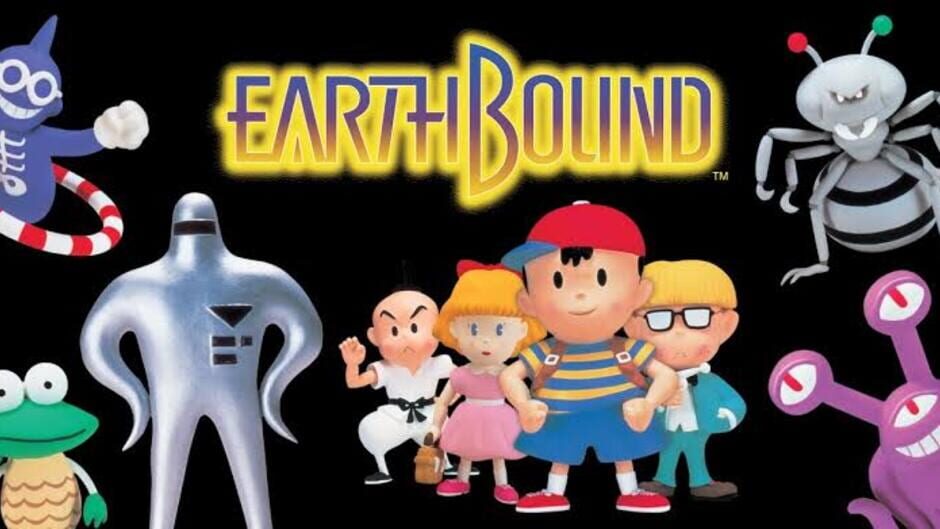
The retro game I chose was Earthbound. I was introduced to it last year and I initially gravitated towards its warm, charming disposition. The game, released in 1994 under the name “Earthbound”, is actually part of a Japanese series called Mother. The game is a delightful recount of the perceived “American experience”. In contrast to games like Doom, which can reinforce the reputation of American violence, Earthbound offers a refreshing perspective on American life following a young boy who represents the classic American childhood, except for alien invasion and zombie dogs. Featuring quirky characters and loving, supportive parents, the game is a pleasant coming-of-age story.
Despite being somewhat frustrating, I also felt nostalgic while playing this game. Most of the time, playing a console-designed game on a laptop is an unpleasant experience, and I spent at least twenty minutes naming my characters. However, that is not the game’s fault so I’ll let it slide. Graphics and gameplay evoke the nostalgia of both old games and childhood itself. Lighthearted, gaudy, and humorous, it evokes a sense of childlike fun. It follows the traditional RPG conventions that we see today in many ways and has a similar gameplay to games like Pokemon. It even has the traditional turn-based attack mini-games that continue to be staples of gaming. As an adult in the twenty-first century, playing this game felt refreshing. In the game, cookies are used as power-ups, and homesickness is experienced after too long between calls to mom. These elements evoke empathy for childhood simplicity and are amplified by the simplicity of the game itself.
This game is meant to be played on a Super NES Game Boy from Nintendo. The controller is a standard SNES controller that emulates many of the controllers we would expect today. The game is played with simple directional arrows as opposed to a joystick, but it does have the standard XYBA keys as well as left and right triggers. With that said, I don’t think the mechanics of the game (mostly walking, calling home, and fighting) are the most important parts. This game, in my opinion, benefits greatly from an anti-proceduralist approach. The procedures of the game are not what sparks discussion and changing how one interacts with the game doesn’t inherently alter the cultural significance.
As I read through reviews of Earthbound and the Mother trilogy, I was amazed at its cultural significance. While the game was not well-received during its US release, the Japanese fan-base was strong. Many people at the time were interested in darker, more serious RPGs, such as Final Fantasy VI, as one reviewer noted1. As the millennium approached, video games seemed to turn away from their brightly colored, pixel-graphic charms.
It got me thinking about how video games can be artifacts that not only harbour messages and highlight critical ideas, but also artifacts that are created because of the critical ideas within society already. In this case, I began thinking about how consumers influence video games, rather than focusing solely on the other way around. Games, then, even if unintentionally critical, can sometimes be products of critical elements of society, such as a cultural shift towards morbidity or violence.
While most reviewers at the time (in the 90s) likely would have dismissed Earthbound as inconsequential or vapid, it has become a cult classic and is now remarked as humorous, heartfelt, and lovable. Reviewers praise its bizarre, yet simple, storyline. They rave about the elements of pure, American coming-of-age. The game garnered a lot of attention, despite a poor marketing campaign and widespread resentment toward traditional, old-fashioned play.
In the game, a young boy wearing a baseball cap hops from fast food restaurants to arcades for HP and battling gangs. The American experience is wholesome and playful in the eyes of Earthbound. I wanted some context. What was the world thinking about when this game was made and what messages might the game be trying to convey? What critical moments is this game a product of? I wanted to see if I could identify potential reasons for the American population’s resistance to such a quirky, fun depiction of their own experience. Some notable events were Columbine, the fall of the Soviet Union (and the end of the Cold War), and the rise of the internet. Major acts of violence affected the lives of teenagers during their childhood and adolescence. Subversive patriotism fueled these acts of violence, which were available online and through video games for the first time. It makes sense that, given the angst and grunge of the 90s, a JRPG would not have sold itself. It was further sunk into kitsch and campy youth culture through the advertising. They leaned into the bizarre, crude humor of Earthbound. Players will find the player’s guide to be distinctively casual and colloquial, contrasting with the grunge-era stoicism and roughness of the 90s. What is now a beloved cult game was once viewed as a crass example of vapid entertainment.

Admittedly, I haven’t finished the game and I’m sure there are a lot of possible critical interpretations of the game. But as someone who is deeply interested in the emotions games elicit in us and what gaming says about culture, this was what I found to be the most interesting.
It was released in a context with which it was incompatible and that changed the success and trajectory of the video game trilogy. In this way, I loved playing Earthbound because it is critical unintentionally. It passively comments on the ways in which culture evolved to devalue bright, light-hearted gaming in favor of fun of a darker kind. It reminded me a lot about the Doom vs Myst reading and the ways in which culture actively diverged between “cool” and “beautiful”. The game, and both its success and lack thereof, serve as artifacts of the time where America asked itself who it was. In some ways, then, its cult fandom and more recent acclamation begs the question: Is America ready to revisit their identity?
Works Cited:
- Keller, Z. (n.d.). Earthbound – review. V’lanna. Retrieved November 5, 2022, from https://archive.rpgamer.com/games/other/snes/eb/reviews/ebrdrev1.html
- Earthbound for Nintendo 3DS – Nintendo Official Site. for Nintendo 3DS – Nintendo Official Site. (n.d.). Retrieved November 6, 2022, from https://www.nintendo.com/store/products/earthbound-3ds/
- Mato. (2009, May 14). Earthbound’s marketing campaign ” Earthbound central. EarthBound Central | Everything EarthBound and MOTHER! Retrieved November 5, 2022, from https://earthboundcentral.com/2009/01/earthbounds-marketing-campaign/
